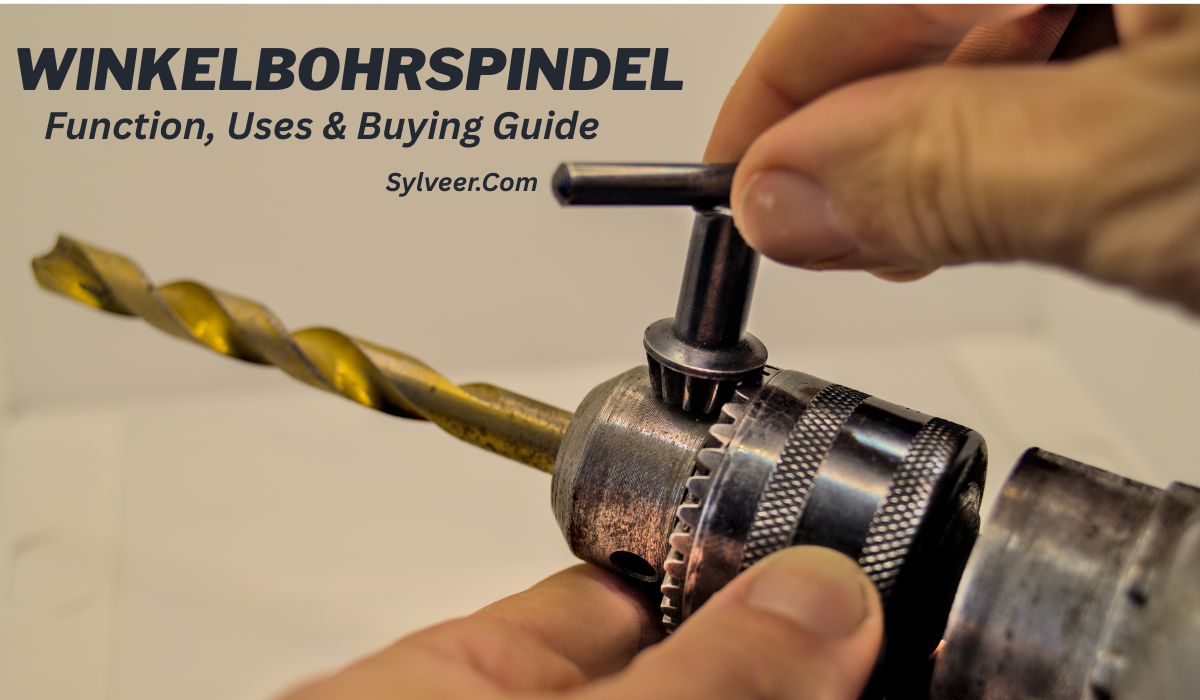Introduction
In modern manufacturing, mechanical engineering, and even in skilled trades, there are always situations where a standard drill chuck or conventional drilling unit reaches its limits. Tight spaces, hard-to-reach areas, or specific machining angles require a smarter solution — and that’s exactly where the winkelbohrspindel comes into play.
A winkelbohrspindel allows precise drilling, milling, or grinding in confined or angled areas by redirecting the tool’s motion at 90° (or another defined angle). But what exactly makes it so special? How does it work, and what should professionals know before using or buying one?
What is a Winkelbohrspindel?
A winkelbohrspindel (translated: angle drilling spindle) is a special attachment or independent spindle unit that enables machining tools to operate at a defined angle. It is widely used in CNC machines, machining centers, and even handheld power tools.
How It Works
- Power Transmission: The rotary motion is redirected through bevel gears, worm gears, or precision bearings.
- Angle Options: The most common setup redirects motion at 90°, but custom versions can work at 45° or 120°.
- Tool Interface: High-quality models are equipped with standardized connections such as HSK, SK, or BT for broad compatibility.
Its robust design ensures precision, reduces vibration, and allows clean, accurate machining even under heavy load.
Why a Winkelbohrspindel is Essential
As industries demand higher precision and efficiency, the winkelbohrspindel has become a critical solution.
Key Benefits
- Space-Saving: Access to narrow or obstructed areas.
- Flexibility: Expands the capability of existing machines.
- Time Efficiency: Reduces re-clamping and setup times.
- Cost Savings: Eliminates the need for expensive specialty machines.
👉 Example: In aerospace engineering, angle drilling spindles make it possible to drill holes inside complex components such as turbine housings or aircraft wings — something that would otherwise be nearly impossible.
Applications of Winkelbohrspindels
1. Mechanical Engineering
In large-scale component production, a winkelbohrspindel enables cross-holes or thread machining in areas that standard drills cannot reach.
2. Automotive Industry
Engine blocks, gear housings, and suspension parts often have tight spaces. Angle spindles provide precision machining without redesigning entire setups.
3. Aerospace Industry
Aircraft parts are made of high-strength alloys. Angle drilling spindles allow consistent, accurate machining while ensuring safety and structural integrity.
4. Skilled Trades & Assembly
Compact winkelbohrspindels are used as accessories for cordless drills or handheld tools. Carpenters, plumbers, and metalworkers use them to work in restricted spaces.
Types of Winkelbohrspindels
Standard Angle Spindle
Designed for general-purpose drilling and milling, usually at a fixed 90° angle.
High-Speed Angle Spindle
Perfect for fine machining tasks, such as in precision engineering or dental applications.
Heavy-Duty Angle Spindle
Built for robust operations in machining centers, handling high torque and heavy tools.
Custom Solutions
Manufacturers also produce tailor-made spindles with unique angles, torque capacities, or coolant supply systems.
What to Consider Before Buying a Winkelbohrspindel
- Machine Compatibility: Check if the spindle interface (HSK, BT, SK, etc.) fits your equipment.
- Torque & Speed: Choose based on whether you need high RPM for precision or torque for heavy-duty machining.
- Cooling System: Models with integrated coolant channels extend tool life and reduce wear.
- Maintenance: Easy access to gears and bearings saves long-term costs.
- Brand & Quality: Renowned manufacturers like BIG Kaiser, WTO, Benz, and Nakanishi are trusted for durability and precision.
Market Outlook & Future of Winkelbohrspindles
Industry reports show that the global tool accessory market is growing at about 4–6% annually. A key driver is the demand for flexible machining solutions. Instead of investing in entire new machines, many manufacturers upgrade existing setups with modular components like angle spindles.
The future points toward smart spindles equipped with sensors to monitor temperature, vibration, and load in real time. This predictive maintenance reduces downtime and maximizes productivity.
Conclusion
The winkelbohrspindel is more than just an accessory. It’s a vital tool that enables complex machining tasks to be carried out with precision, efficiency, and cost-effectiveness.
From aerospace to automotive, and even in everyday woodworking or plumbing, angle drilling spindles save time, reduce costs, and open new possibilities.
When choosing one, focus on compatibility, durability, and support from reputable manufacturers — not just the price tag.
FAQs About Winkelbohrspindels
1. What is a winkelbohrspindel used for?
It’s an angle spindle attachment that redirects rotary motion to drill, mill, or tap holes in confined or angled positions.
2. What types of winkelbohrspindels exist?
Standard, high-speed, heavy-duty, and custom-designed spindles are available, depending on the application.
3. How is a winkelbohrspindel different from an angle drill?
An angle drill is usually handheld, while a winkelbohrspindel is a high-precision spindle for CNC or industrial machines, capable of withstanding higher loads.
4. What should I check before buying one?
Ensure compatibility with your machine interface, required torque and speed, cooling options, and the reputation of the manufacturer.
5. How long does a winkelbohrspindel last?
With proper maintenance and lubrication, high-quality models can last for years, even under continuous use.
6. Are there winkelbohrspindels for home or DIY use?
Yes, smaller, compact versions are available for cordless drills and power tools, making them useful for carpentry, plumbing, or furniture assembly.
7. Which brands are known for high-quality winkelbohrspindels?
Some of the most trusted names are BIG Kaiser, WTO, Benz, and Nakanishi, known worldwide for precision engineering.

